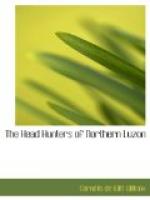By the time we had done the village, the hour of business had come, and we moved up to the little parade in front of the cuartel, where an enormous crowd had already assembled. As at Campote, so here, and for the same reasons, very few old women were present, but about as many young ones and children as there were men. Our approach was the signal for the dancing to begin, and once begun, it lasted all day, the gansas never ceasing their invitation. Apparently anybody could join in, and many did, informal circles being formed here and there, for the Ifugaos, like all the other highlanders, dance around in a circle. Both men and women took part, eyes on a point of the ground a yard or so ahead, the knees a little bent, left foot in front, body slightly forward on the hips, left arm out in front, hand upstretched with fingers joined, right arm akimbo, with hand behind right hip. The musicians kneel, stick the forked-stick handle of the gansa in their gee-strings, with the gansa convex side up on their thighs, and use both hands, the right sounding the note with a downward stroke, the left serving to damp the sound. The step is a very dignified, slow shuffle, accompanied by slow turns and twists of the left hand, and a peculiar and rapid up-and-down motion of the right.
True to what had been said the day before, a particularly large circle was formed, and Cootes and I were invited to join, which we did; if any conclusion may be drawn from the applause we got (for the Ifugaos clap hands), why, modesty apart, we upheld the honor of the Service.
Every now and then the orators had their turn, for a resounding “Whoo-o-ee!” would silence the multitudes, and some speaker would mount the tribune and give vent to an impassioned discourse. One of these bore on the killing of the prisoner that morning: the orator declared that he was a bad man, and that he had met with a just end, that the people must understand that they must behave themselves properly, and so on. I forget how many speeches were made; but the tribune was never long unoccupied. Another performance of the day was the distribution of strips of white onion-skin paper. On one of his previous trips Mr. Worcester had noticed that the people had taken an old newspaper he had brought with him, cut it up into strips, and tied them to the hair by way of ornament. Acting on this hint, it is his habit to take with him on his trips to this country thousands of strips, and everybody gets a share according




